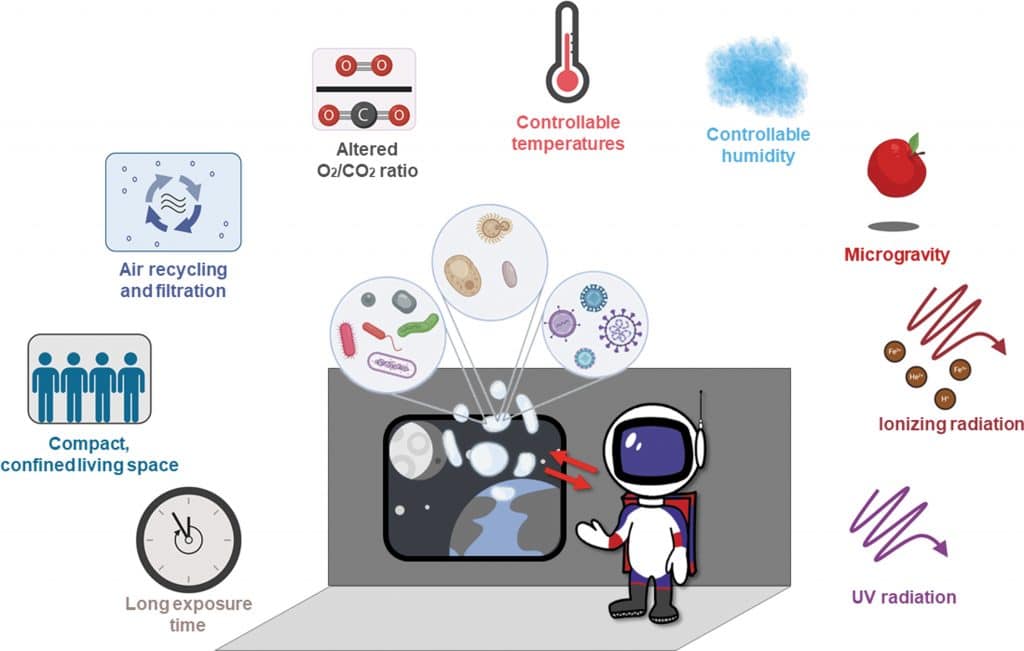
Researchers study how viruses affect astronauts in space
In an article published in the electronic version of the magazine astrobiologyResearchers from the Institute of Space Medicine at the German Aerospace Center have been exploring virology in space habitats. In addition to the many other ways in which going to space affects human health, researchers say a better understanding of how viruses behave in space is critical, especially as space travel becomes more frequent, including its inclusion in a potential future mission to Mars. .
Lead author Bruno Pavelic, a space microbiologist at the German Aerospace Center, said in an interview with the site. space.com.
First, the team analyzed data from previous research on the abundance and diversity of viruses in space environments, particularly a study published in the journal Connecting with nature in 2019, who analyzed the presence and functioning of viruses aboard the International Space Station (ISS). In this approach, the researchers used information collected by swabs from surfaces in an orbital laboratory to sequence the viral genomes and identify different viruses.
Dormant viruses can be reactivated in space
About 95% of the viruses found were called phages, which are viruses that infect bacteria. Another 1% were plant or algal viruses or unidentified viruses. However, the remaining 4% were human or animal viruses, including: human papillomaviruses, which can cause warts; herpes viruses, which can cause cold sores, as well as diseases such as chickenpox and mononucleosis; and adenoviruses, which cause a wide range of diseases, including the common cold.
The results show that despite the quarantine measures space agencies now require before manned launches, pathogens still reach outer space, Pavelic said. “We wanted to point out first of all that viruses can get there,” he said.
The researchers also explored how the space environment might affect viruses and their human hosts. Research shows, for example, that some viruses that are dormant in astronauts’ bodies — meaning they’re still in the body but don’t reproduce or cause symptoms — can sometimes be reactivated in space. And reactivated viruses, whether in space or on Earth, can cause symptoms, but not always, and can be contagious, as is the case with chickenpox.
Tests on astronauts in space shuttle programs and more recent space station missions show a reactivation of the virus. In some cases, astronauts have developed rashes from reactivated herpes viruses.
Although scientists aren’t sure exactly what caused the reactivation, study researchers suggest it may be related to exposure to ultraviolet light, which has been shown to reactivate viruses in rodents and suppress the immune systems of humans and other animals.
Virus activation can also be influenced by factors such as differences in humidity and intensity, as well as dehydration and sleep deprivation, which astronauts often experience in space.
Simulation on Earth does not reflect the health of the astronauts 100%
“We weren’t designed to be in space,” said study co-author Anna Nascimento, a virologist at the German Aerospace Center. Here we get all of these factors at the same time. »
Because of the unique combination of these factors in space, Pavletich says terrestrial research on the topic has limits. Although these studies simulate some of these factors — such as humidity, radiation and microgravity — other effects, such as the specific physical and psychological stress astronauts experience in space, can affect their immune systems, which means the simulations on Earth It may not provide the full picture. A picture of how viruses affect humans in space.
Future research should focus on keeping astronauts as healthy as possible, “which may be very different from keeping people healthy on Earth,” according to the study’s lead author, Ralph Muller, chair of the Space Medicine Institute’s Space Microbiology Research Group. . From the German Aerospace Center. “Maybe we need to establish a baseline: What does health mean on Earth and what does health mean in space? We are talking about two completely different topics,” Mueller said.
Have you seen our new videos on Youtube? Subscribe to our channel!
-
Know all about viruses and deal with them: Coronavirus Flus Ebola SARS and other viral diseases
-
Viruses: enemies or allies? (scientific issues)

“Organizer. Social media geek. General communicator. Bacon scholar. Proud pop culture trailblazer.”


